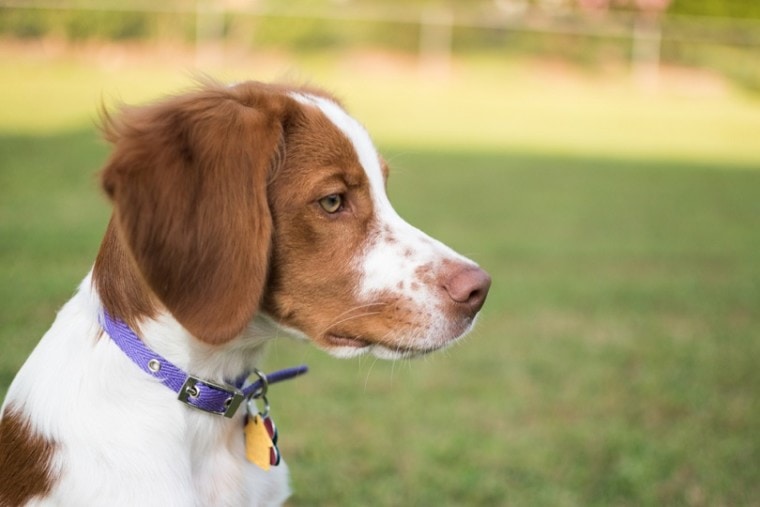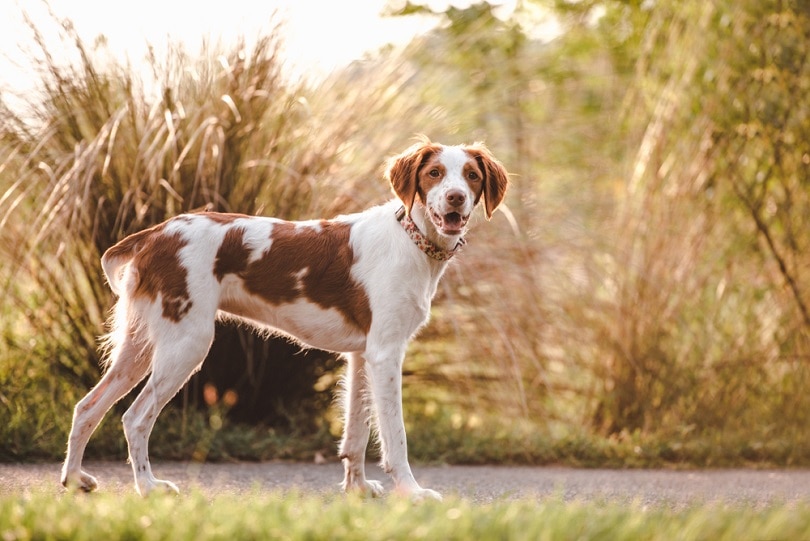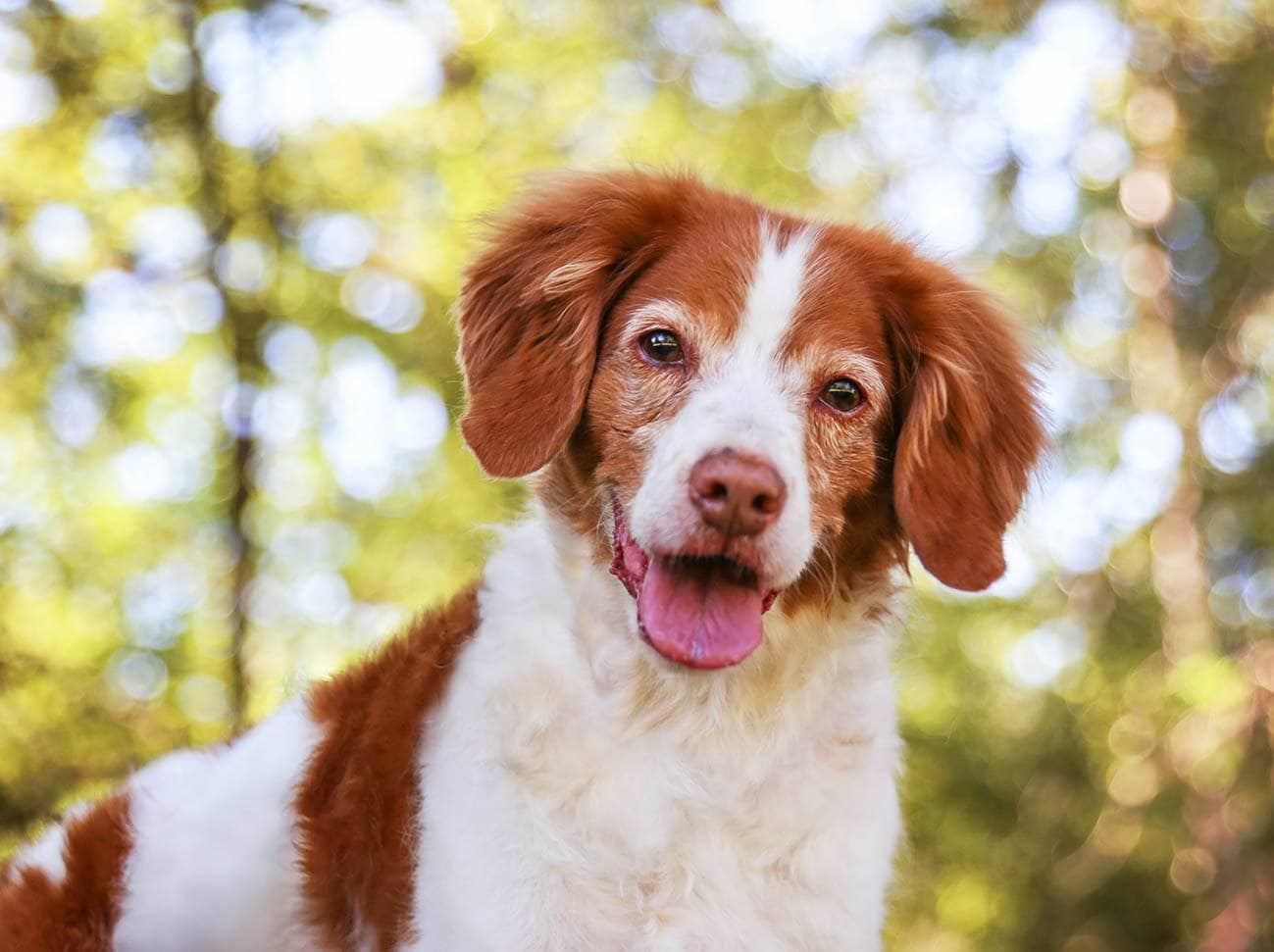
Click Below to Skip Ahead
Life with a Brittany is never dull, not with the bold and intriguing coat, zealous demeanor, and versatility. Also known as Brittany Spaniels, these dogs have a leggy appearance and are a sight to behold!
Paintings and tapestries place this dog breed in the 1800s in France, in Pontou, a small town in the Brittany region. Legend has it that they resulted from crossing small land pointer spaniels and white English setters.
Some offsprings were tailless, and so are modern Brittany dogs. However, you can find some bob-tailed Brittany dog breeds.
Breed Overview
Height:
12 – 20 inches
Weight:
30 – 40 pounds
Lifespan:
12 – 14 years
Colors:
Tri-color, orange & white, black & white, liver & white
Suitable for:
Active and available family, homes with a fenced and spacious yard
Temperament:
Intelligent, alert, soft, sensitive, energetic, playful, strong prey drive
The fact that Brittany came from sporting ancestors laid a foundation for modern Brittany. They are the most gifted gundogs of all time and the perfect choice for anyone who wants an agile dog with a love for speed.
It’s an intelligent breed that does well in retrieval and hunting sports. This dog can be mellow or active, gentle or stubborn, though good-natured generally.
Yes, the Brittany dog breed is energetic and enthusiastic, requiring space to run and play. It’ll do well in a large yard or a country environment. And if you have kids and a swimming pool, this dog loves water, so be sure to create lasting memories every time you swim.
What else does this breed hold? Keep reading to find out.
Brittany Dog Characteristics
Brittany Puppies

Brittany dogs are intelligent, energetic and playful. These dogs come with various expenses, including vet fees, food supplies, grooming, training costs, and much more.
Optional costs like microchips, licenses, spaying or neutering, boarding facilities, and insurance plans will, of course, heighten the cost of ownership.
Temperament & Intelligence of the Brittany Dog

A Brittany is a pretty face and a store for personality. It is a quick, curious, playful, and excellent watchdog.
Brittanys are more of a soft breed, so harsh voices and reprimands are likely to hurt them. On the other hand, they are bright, independent, full of energy, and active, requiring at least a yard to run.
Bred to hunt birds, these dogs can be single-minded when it comes to their feathered prey.
Interestingly, Brittany’s temperament depends on various factors, including gender, bloodline, socialization, and training.
While you can’t do much about gender and heredity, you can socialize your dog. These dogs require early exposure to various people, sights, pets, sounds, and experiences to grow up to be all-rounded.
Are These Dogs Good for Families? 👪
These dogs are active indoors or outside, so they’ll thrive in a vibrant and fun household. However, they are not for the apartment or city lifestyle unless you have enough time and are ready to play, hunt, and train with your pup anytime.
Brittanys love their families and will seek attention from them whenever they feel like it. Unfortunately, a Brittany dog breed has a sensitive personality that makes them love to be around people. Leaving this pup alone won’t end well because a bored Brittany is a destructive and anxious Brittany.
These dogs may be enthusiastic and challenging in the field, but they are gentle and dotting at home. They are also notoriously gentle and so protective of kids. However, Brittanys dogs need supervision around young children.
It’s easy for them to knock over seniors and kids during playtime thanks to their long legs and excitable demeanors. They are also wary of strangers.
Does This Dog Get Along with Other Pets?
Brittany dogs have a lot of love to share, especially with other pets. And if you have similarly playful and energetic pets, the better. They are ready to embark on fun adventures with any willing partner.
However, start socializing your dog with other pets as soon as you bring it home. Brittanys have a high prey drive but can hang out with other dogs or cats if you raise them together. Pet bunnies and birds may not be fortunate enough, though.
Things to Know When Owning a Brittany Dog
The Brittany breed is pretty hardy and requires little maintenance. However, low maintenance does not mean they are hypoallergenic or require minimal vet visits.
They can develop health issues, inherit a disease from their bloodline, and require extra care just like other hybrids. So, here’s what you should know before you adopt a Brittany.
Food & Diet Requirements 🦴
A highly active, energetic breed requires good quality food besides snuggles and playtimes.
The National Research Council recommends that a playful adult Brittany weighing 30-40 pounds requires a caloric intake of 1109 kcal daily. This means that you should provide your pup with 1½ to 2 cups of well-balanced dry dog food every day, divided into two meals.
Neutered or spayed dogs require fewer calories while growing puppies consume more than adult dogs. However, how much you should feed your dog depends on how active it is, its age, and the nutritional requirements specified by the vet. Just ensure that you watch for obesity by offering it enough food and dividing its meals into two times a day rather than one main meal.
Plus, take note of the treats, what foods to feed your Brittany, and what to avoid to prevent potential life-threatening issues brought by the wrong foods.
Exercise 🐕
Brittanys are active, joyful, playful, bright, and doers. They love to be on the go.
A Brittany will snuggle with you only at night and spend the whole day wearing out in the yard with you.
They require lots of physical and mental stimulation and nothing like a tired, busy, and inactive owner. Also, ensure that you can access a large and securely fenced yard if you plan to bring such an energy-packed furry ball into your home.
A Brittany’s DNA is full of adventure, and no amount of training or treats can change the fact that your pup will want to go out hunting or sprinting. So tag your pooch along on your bike rides and morning runs, and it’ll be happy being your workout partner.
You can also incorporate physical activities with brain games like food puzzles and interactive playthings to help with their high intelligence.
Always ensure that you give your Brittany a chance to stretch its legs, even if it’s snowing and cold. But since they don’t have the thickest coats, just ensure you don’t leave your dog out for too long.
But, Brittanies are sprinters and can sprint out of sight at any chance. So, keep your pup in by putting up good and high fences.
As much as Brittanies love to be on the move, it would be best to be on the lookout for signs that your pup could be getting too many exercises. Slow down if you have to, but don’t stop working out with it.
Training 🎾
Of course, the perfect and dream Brittany doesn’t come ready-made. Any dog, including the friendly and calm breed, can develop offensive levels of barking, aggression, digging, and other problem behaviors without sufficient training.
Training a pup can be difficult, but Brittanies are sensitive, intelligent, and people-pleasers, traits that will make the training sessions a walk-over. It’s easier only if you start early, though.
These dogs were bred to hunt, so they tend to pick up hunting skills at an early age. And, they don’t forget what they learned between training seasons.
It would be best to start training your canine as soon as you bring it home. Even as young as two months old, any young Brittany is capable of soaking up everything you teach it.
You can admit your Brittany into a puppy kindergarten class for socialization skills or train it at home and introduce it to every pet, person, and condition. Kindergarten services only allow puppies that have received certain vaccines, so be sure to check with your local services.
Brittanys have heightened intelligence, but this doesn’t mean that you should take them through harsh and vigorous training. These pups are sensitive and only thrive under positive-oriented training sessions.
Of course, trainers are required to be resilient, authoritative, and firm-but harshness and punishment is a NO for Brittany dog breeds.
Grooming ✂️
Brittany dog breeds have dense, flat, and wavy coats that are not silky or curly, with a bit of feathering on the ears, legs, and belly.
They shed moderately, so taking care of your dog’s coat shouldn’t be overly complex. You only require weekly brushing to prevent hair from building up on your floor and furniture. An occasional bath, only when it gets dirty, is a great way to keep it smelling fresh.
The rest is essential maintenance, like getting the nails trimmed every couple of weeks. Brushing your dog’s teeth weekly is good for its overall well-being and fresh breath.
Health & Lifespan 🏥
Brittanys are considered healthy and hearty dog breeds, except for the potential to develop genetic conditions and inherit diseases just like other breeds. Not all Brittany dogs get these illnesses, but you may want to stay aware if you want to adopt one.
It would be best to run from any breeder who is reluctant to offer the prospect puppy’s health guarantee and show you the health certificates of all your puppy’s parents.

- Hip Dysplasia
This is a malformation of the hip and elbow joints that can be crippling sometimes. Proper diet and exercise can result in good quality and active life in mild cases. However, a vet can recommend surgical repair if it’s severe.
This disease can be caused by several factors, including diet, genetics, and environment.
- Seizure Disorder
A dog with a seizure disorder can be suffering from epilepsy, which is often hereditary. In addition, events such as severe head injuries, metabolic diseases, exposure to poison, or infectious illnesses that affect the brain can trigger seizures.
It can also be due to an unknown cause (also known as idiopathic epilepsy). Although seizures are not fun to watch, their prognosis is pretty good, especially if it’s due to unknown causes. You can control it with medication from the vet.
- Hypothyroidism
This is a common hormonal disease that occurs when the thyroid gland fails to produce sufficient thyroxin hormone.
Obvious signs include obesity, droopy eyelids, feeling lethargic, mental dullness, and irregular temperature cycles
Vets can treat this condition with medication, which a dog must continue using daily throughout its life.
Brittany dog breeds may inherit this condition that causes the eye lens to cloud, blocking light from getting into the eyes. Untreated cataracts can cause blindness.
- Cleft Palate
You may notice this birth defect in young Brittanys with an opening between the mouth and nose. Tissues separating the two organs do not grow together properly, creating an opening in the lip, or along the mouth’s roof.
Unfortunately, puppies with this condition have feeding difficulties and may die of starvation.
 Male vs. Female
Male vs. Female
A Brittany’s personality can vary according to gender. Spayed and neutered males tend to be calmer and more friendly than females, but of course, temperaments boil down to socialization, training, and upbringing.
You can also notice that male Brittany dogs are a bit taller and heavier than females. However, most owners find females more intelligent and much easier to train than males.
Next on your reading list:
3 Little-Known Facts About the Brittany Dog
1. Brittany dogs are no longer known as Spaniels because their hunting skills are similar to a Setter. The AKC dropped the term “spaniel” in 1982.
2. These dogs are the leggiest of all sporting breeds. The American Kennel Club’s standards suggest that the height of a Brittany at the shoulder is the same as its body length.
3. Brittanys have well-opened nostrils to allow deep breathing.
Conclusion
This breed is hyperactive and requires active and available family members to keep them on their toes and prevent boredom. Brittanys are an excellent option for anyone who wants to stay active, although they can be a little too much for young kids and seniors.
These dogs may want your attention all through, but no mistake – Brittanies are not couch potatoes! They are overachievers who would choose a heart-thumping workout rather than snuggle on the couch with you.
Generally, Brittanys have a significant presence and will always lighten up any home.
Related Reads and Breeds:
Featured Image Credit: Patty’s Photography, Shutterstock







